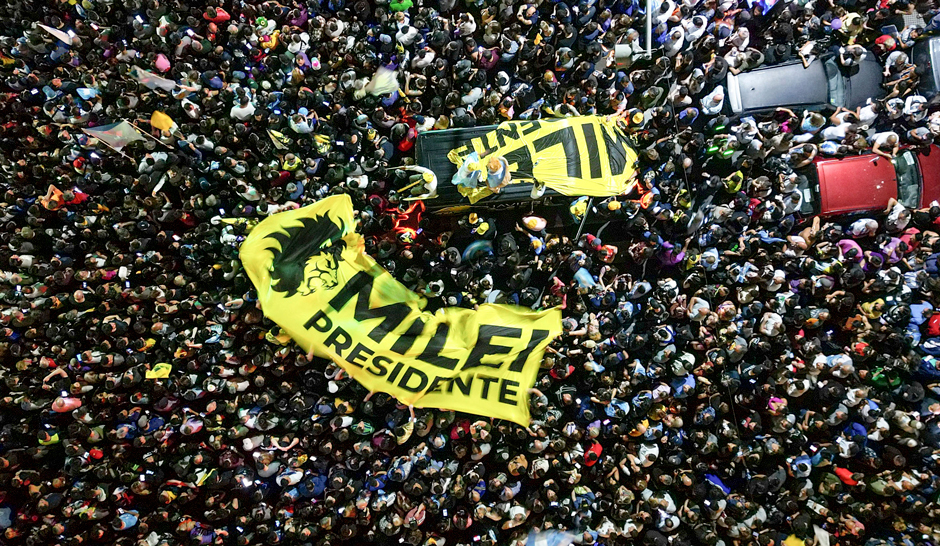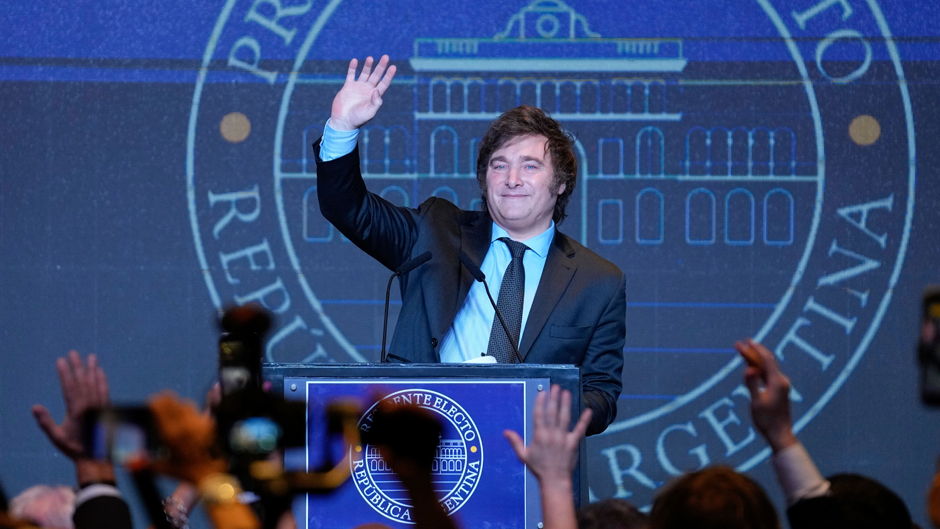After a very heated electoral campaign, Argentina chose a new president on Sunday. Javier Milei, a former television pundit with little political experience, received 55.7 percent of the vote, beating his opponent Sergio Massa, the former Minister of Economy.
A far-right candidate who has put forward unorthodox ideas as part of his political platform, Milei is seen as a radical alternative to Massa, who has extensive political experience. Massa received 44.3 percent of the vote.
Argentina, Latin America’s third largest economy, is undergoing a spiraling economic crisis, with inflation close to 140 percent, according to the latest official figures by the Argentinian Ministry of Economy.
John Twichell, lecturer and director of Latin American Studies in the University of Miami College of Arts and Sciences, offers insight into what lies ahead for Argentina.
What does a Javier Milei presidency mean for Argentina?
A newly elected President Milei equates to a complete disruption of the political establishment in Argentina.
The election outcome reveals the depths of Peronist mismanagement of the country’s disastrous economy and an overall sense—whether or not well-founded—that drastic changes are needed to put Argentina on a course of correction.
For Argentina, this means the rise of amateur, outsider, populist political leadership, not uncommon in Latin America and the Caribbean, as we’ve recently seen in Brazil, El Salvador, and Venezuela. For the past four decades in Argentina, political parties and coalitions functioned through competition and consensus within the institutional framework of democracy. An amateur, outsider scenario threatens the very institutions of democracy because outsiders like Milei—who have little to no experience working through democratic institutions—tend to quickly grow frustrated by them, see them as impediments to authoritarian rule, and have, as in the above cases, taken steps to dismantle those institutions.
What are the main challenges this president faces?
There are four main challenges: economic, financial, political, and societal.
The main economic challenge Milei faces is inflation and keeping his promise to tame inflation. His idea is to cut the Peronist government subsidies that have kept the prices of utilities and transport below market rates. But Milei said leading up to Sunday’s vote that he would not cut the subsidies because of the pain it would inflict. So, it’s not clear how he will address the challenge posed by inflation.
The main financial challenge Milei faces is the responsibility of negotiating with creditors, including the International Monetary Fund, bondholders, and China who, altogether Argentina owes well in excess of $100 billion. Given that neither diplomacy nor political experience are among Milei’s qualities, such negotiations could be his greatest challenge.
The main political challenge Milei faces is to somehow work with the Peronists who he disparagingly labeled the political “caste” and yet whose obstructionism could quickly thwart Milei from making good on his promise to “reduce privileges, not rights.” This will be especially difficult for Milei, who is not trusted by much of the economic and political establishments in Argentina, nor will he arrive to the presidency with functioning administrative teams in place.
The main societal challenge Milei faces is to dispel the fears of most Argentines that he is a right-wing extremist bent on reversing social justice and rights fought for during and since the brutal military dictatorship of 1976-1983. Milei and newly elected Vice President Victoria Villarruel are both against abortion rights and gun control, they have both questioned the extent of the atrocities carried out by the military dictatorship in a direct affront to the transitional justice process, and they have declared “tyranny” to be the solution to Argentina’s current crisis. Combined, such rhetoric poses a threat to democratic norms established over the past four decades and raises the specter of a return to the days of depoliticization, human rights violations, and repression that defined the right-wing dictatorship. For many, especially those who lived through the right-wing military dictatorship, Milei and Villarruel, who has also questioned the extent of the crimes committed by the dictatorship, pose a threat to democracy and social justice. Based on this platform, their victory in this election is ironic, given that in December, Argentina will commemorate 40 years of democratic rule.
People are worried about extreme social polarization and whether or not the new Milei-led government will listen to dissenting opinions and positions on policy. There is likely to be a rising sentiment of resistance to any moves by a Milei government to promote further polarization or to oppress contradictory views.
Can there be a way to mend the deep polarization that exists in the country (both electorate and government)?
Milei represents not only a failure by the Peronists to govern, but also a failure by the center-right Juntos por el Cambio (JxC) to put forward a competitive candidate in Patricia Bullrich and a platform able to convince a sufficient percentage of the electorate to reject radicalism and the unknown. For the primaries, Peronism boosted Milei in various ways to weaken the JxC coalition, which it considered more difficult to defeat in a second round, but that strategy did not work, yielding an amateur, outsider president.

Supporters of Javier Milei gather outside his campaign headquarter after the election. Photo: The Associated Press
The question is how this anti-establishment figure (Milei) will be able to govern as president, which will require getting support in Congress to approve and implement his proposed market-led reforms, many that will be bitterly opposed by unions and other societal interest groups.
In terms of the electorate, the broad sentiment going into the election was that neither presidential candidate was a good option. Those who voted for change in Milei did so out of economic desperation and so they will have little to no patience to wait for relief. Milei’s support will hinge on his ability to rapidly stabilize the economy and control inflation. Inflation is nearing 150 percent and 40 percent of Argentines are living in poverty.
There is major discontent with the status quo of the economic situation with its impacts being felt broadly throughout numerous sectors of society. Milei is perceived as a threat to many sectors of society for his intended approach to marketize Argentina’s economy and impose cutbacks to state budgets and services.
What are the implications of this presidency for the economy?
Campaign promises have highlighted the economy. Milei faces the same short- and long-run threats to Argentina’s economy as would have Massa. In the short-run, forecasts are for annual GDP to decline by 3 percent by the end of 2023, with the peso’s official exchange rate moving to upwards of 600 per 1 dollar. Yet economists also predict Argentina’s economy could rebound in 2024 if the agriculture sectors bounce back from this past year’s drought, and if boosts in domestic energy supply from Vaca Muerta reduce expensive energy imports that have been a major fiscal constraint.
Milei has made elimination of commodity export taxes along with replacement of the peso with the U.S. dollar as Argentina’s official currency a pillar of his campaign platform to boost international competitiveness. This promise gained him support from agricultural producers in the Pampas. In terms of energy, along with the elimination of price controls and subsidies, Milei intends to again privatize the state-owned oil company YPF that was nationalized by the Peronists in 2012 to promote competition and foreign investment in national energy production. Yet Milei’s plan to replace the peso with the U.S. dollar is widely considered impractical given that the Argentine central bank holds few dollars in foreign reserves with limited access to international financing.
Milei also wants to reduce government expenditures by 15 percent of GDP, which he has indicated achieving by way of elimination of domestic subsidies and market reforms. The Peronists have warned that Milei’s policies would increase the cost of utilities, petrol, and public transportation. In the last weeks of campaigning, Milei has sought to moderate his radical image, ruling out controversial economic policies for which he has previously expressed support, such as privatization of education and health care. Yet in the final days of the campaign Milei denied he would take such measures. It now remains to be seen what his economic policies will be.
What are the implications for the Indigenous people and their lands under this presidency?
Milei has promised to implement an “anarcho-capitalist” international-market-driven approach to governing in pursuit of economic growth funded by agricultural and mining extractivism throughout Argentina. This is in direct conflict with Indigenous peoples and their land rights. Indications are that Milei will, not unlike former President Donald Trump in the U.S., engage in transactional politics both domestically and internationally, posing a threat to environmental sustainability, which requires global collective action through cooperation and diplomacy, neither of which appear to be strong suits of Milei.

